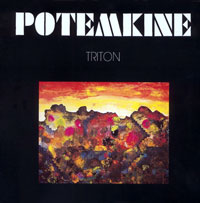![]()
![]()

![]()
(…) POTEMKINE were unique innovators themselves in French explorative jazz-rock, though almost certainly originally inspired by SOFT MACHINE. Formed by the Goubin brothers and Doudou Dubuisson, the band were pretty stable (adding a third Goubin on Keyboards), taking Zeuhl-isms and twisting them into a music of their own creation. (...) Their debut lp, aptly titled FOETUS saw a gelling of moody jazz forms, like a sedate ZAO, with many of the caracteristics we normally associate with the Canterbury scene. It would seem that working with VERTO after this rubbed-off on them greatly, and as a precise trio they came up with the Zeuhl masterwork TRITON, a condensing of those ideas Jannik TOP was all too rarely given ample room for in MAGMA, recomposed into fiery rock and jazz forms, all complex jigsaw-puzzles of riffs, motifs/refrains and solos, linked in a way unexplored except in more recent UNIVERS ZERO and PRESENT,… Barely 6 months on though it was all-change, moving to a more typically French lightweight jazz-rock with a funky edge. The 3rd Goubin brother was involved full-time with this one and I guess it is his jazz roots that tookover. 1978's NICOLAS II is a fine album for fans of French jazz-rock.
AUDION, in Issue 43 (Fall 2000)
![]()
Potemkine : "Triton" & "Nicholas II" ( Soleil Zeuhl 04 & 05, 2001, CDs )
The true measure of the quality of an album is how well it stands the test of time. Potemkine passes this test exceeding well as these two albums that were both recorded over 20 years ago still sound fantastic.
The band was active in their native France from 1971-1982 and they recorded three albums, all of which are contained on these two discs from Soleil Zeuhl. Potemkine had a very original sound that contained elements of fusion, Zeuhl, and 20th century contemporary music (influenced by composers such as Varese, Satie, and Debussy).
Their classic second album, Triton, was a quartet effort that combined distinctly Zeuhlish baselines with a spare and somewhat dissonant acoustic piano to sound like Wiedorje combined with Univers Zero. The band had attended Magma concerts and eventually even opened shows for them, and they clearly absorbed some influences. Potemkine's high-pitched wordless vocals add a sense of mystery, and overall the music can be moody and intriguingly dark in places.
The third and final album, Nicolas II, was more fusion-oriented as the band had gone to an electric keyboard sound and had moved beyond the contemporary classical influences. One point of reference might be Return to Forever in their Hymn of the Seventh Galaxy phase, only with a better sense of melody.
The two discs are packed with bonus tracks, which include all of their self-released first album, Foetus, as well as their first single. This means that these two discs contain the entire recorded output from this legendary band, and they also include excellent liner notes and band photos. The earlier material shows an evolving band but it is also very good with some strong guitar work and a violinist added to the quartet. Potemkine's Triton and Nicolas II are outstanding achievements that rate with the best progressive fusion recorded in the 1970's by any band from any country. If you haven't heard these discs then you really owe it to yourself to investigate them.
David Ashcraft ( Expose - Issue 23 - December 2001 )
E-mail : soleilzeuhl@soleilzeuhlrecords.com